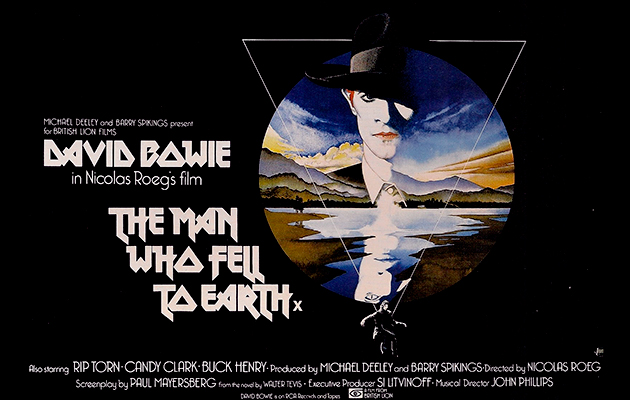To mark the passing of director Nic Roeg, please enjoy this feature from Uncut's Take 103 issue [December 2005] on the making of The Man Who Fell To Earth _____________________ It is January 26, 1975 and, at his London home, film director Nicolas Roeg is transfixed. On his TV screen, a pale, hol...
As for The Man Who Fell To Earth, it’s more striking than ever, even though Roeg is convinced it would never get made today – “for all kinds of extraordinary reasons”. This has little to do with censorship or subject matter but rather because, in this age of multiplex mass-marketing, film-making is becoming ever more reductive.
“It’s such a financially driven business,” he explains. “It encourages non-progression. You have to see the different things around you while you’re filming. In the first scene of The Man Who Fell To Earth, Bowie is walking down the road and passes a children’s playground. Suddenly, just as we were going past, an old tramp in one of the rides sat up and belched. There’s no way we could have planned that, but it set us up for the end scene, too. The first human noise in the film is a belch and so is the last one, where Bowie burps at his table. So every aspect of that is due to the time we were filming. It’s all to do with this belief that everything is linear.”
Candy Clark is convinced of the power of Roeg’s film: “It was very advanced then and it still is. And the cinematography is just over-the-top beautiful.”
Si Litvinoff believes the film to be, along with Walkabout and Don’t Look Now, one of three Roeg “masterworks”.
For the director himself, The Man Who Fell To Earth – unlike Thomas Newton – achieved its goal. “I didn’t want to fall into the trap of curious people with pigs’ heads or ears as extraterrestrials,” he explains. “I wanted to touch on people who don’t quite understand what’s happening. When I was thinking of making the movie, it struck me how short a time it was since people with autism or cerebral damage were considered lunatics and chained to fences.”
Through David Bowie, he succeeded: “For me, he is Mr Newton, in that I can only think of him as Mr Newton. I’ve never seen him as good in any other film he’s made since, probably because he wasn’t acting. The Man Who Fell To Earth was the perfect non-acting piece. I mean, how does an alien act?”
The author of this article would like to thank Nicolas Roeg, Candy Clark, Si Litvinoff, Buck Henry and Maggie Abbott for their help. All were interviewed exclusively for this piece in September 2005. Two excellent Bowie tomes were also used: The Complete David Bowie by Nicholas Pegg (Reynolds & Hearn, 2002) and Strange Fascination – David Bowie: The Definitive Story by David Buckley (Virgin, 1999). The Man Who Fell To Earth is available on DVD on Anchor Bay



